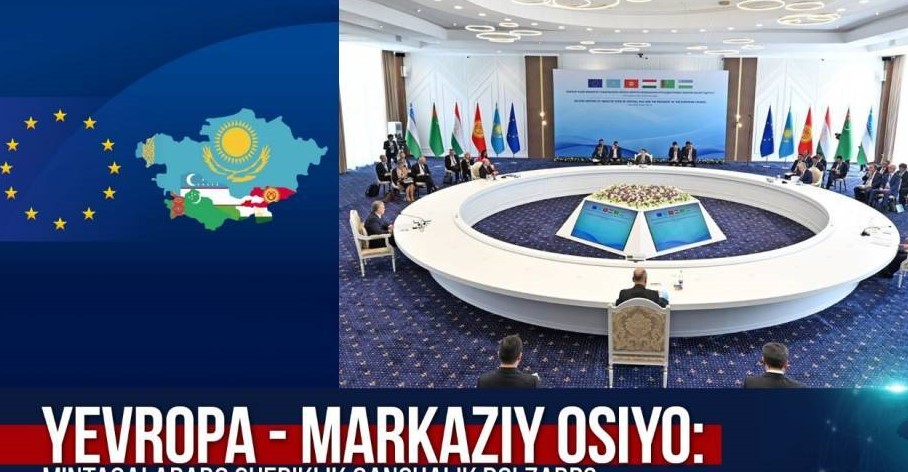The history of cooperation between the peoples of Europe and Central Asia goes back several centuries.
Nowadays, trade, economic, and investment cooperation between Central Asia and the countries of the European Union is strengthening within the framework of bilateral and multilateral relations. Central Asia is becoming a center of gravity for leading European companies and banks, a place of new economic opportunities. This is well reflected in the example of investment and technological cooperation aimed at creating modern industrial capacities, introducing green energy, developing smart agriculture, and creating a developed transport and logistics infrastructure. The volume of trade between Uzbekistan and the European Union is growing steadily thanks to the Generalised Scheme of Preferences Plus (GSP+).
At the next edition of the “Diplomatic Perspective” project, together with political scientist and teacher at the University of World Economy and Diplomacy Kakhramon Dalimov, we will analyze the possibilities of interregional partnership between Europe and Central Asia, the role of Uzbekistan in this, as well as the prospect of enhancing collaboration.
– How relevant is interregional partnership between the countries of Europe and Central Asia?
– Regional cooperation between Central Asia and the European Union is relevant for several reasons, – says Mr. Dalimov. – First, it is essential to promote a comprehensive process of supporting dialogue and cooperation between the five Central Asian countries. As the Head of our state noted, the global and regional situations have changed dramatically, and European partners require more active support for the integration process in Central Asia.
Second, regional cooperation is essential in developing energy, environment, climate, water resources, and socio-economic partnerships, including the opportunity to improve the quality of education and research, especially in matters of regional security. In this direction, practical assistance is provided within the framework of joint EU programs to combat terrorism, radicalism and religious extremism, organized crime, drug trafficking, and other common problems that have become complicated due to the situation in Afghanistan.
– How do you evaluate this cooperation?
– Central Asia is one of the fastest-growing regions with a favorable geopolitical position. Due to the growing role in the global economic process, the interest of the largest countries in our region is growing. The European Union is not yet the leading partner of Central Asia, unlike China, Russia, and the United States of America.
The particular importance of the region is reflected in the growth rate of foreign trade. The leader in this regard is China. In 2022, compared to 2021, it almost doubled its trade turnover with Central Asian countries and brought it to $70 billion. The EU had the same situation at that time: trade turnover with Central Asian countries increased from $27 billion to $47 billion.
Türkiye, Japan, South Korea, and some Arab countries can compete with the European Union in the region.
Central Asia has never been in the EU’s area of vital interests or at the center of its foreign policy agenda: it first appeared in the official document “European Security Strategy” only in 2003.
Central Asia is primarily essential for the European Union due to its location. Our region, which has a convenient geostrategic location, has a vast reserve of energy resources and a high potential for entering the market.
The expert community of Central Asia has identified several problematic areas of cooperation, including the fact that the EU does not sufficiently know and consider the region’s general characteristics, as well as the lack of full communication between the EU and other external actors – Russia, China, and India.
Today, there is a rapprochement between our regions. A clear reflection of this rapprochement is the first official summit of the EU and five Central Asian countries, which is planned to be held in Uzbekistan in April. The official announcement of promising plans at the closing ceremony of the European Union Investment Forum for Central Asia in Brussels is further evidence of the rapprochement of the two regions. Since the beginning of 2022, relations between the countries of Central Asia and the EU have significantly strengthened. This is visible from the increasing number of mutual visits of heads of state and foreign affairs agencies. In this regard, the High Representative of the European Union for Foreign Affairs and Security Policy, Josep Borrell, noted that the EU may not have paid enough attention to developing interrelations. Still, through joint efforts, the two regions decided to correct this shortcoming.
We hope the European Union’s involvement in Central Asia will intensify in all areas.
– How do you assess the efforts to strengthen interregional ties? Are there any obstacles?
– In my opinion, the European Union needs to consider the diversity and uniqueness of growth rates in its relations with the five Central Asian countries and recognize the presence and importance of other external partners and projects in the region. These two factors could seriously hinder the implementation of the EU Strategy in Central Asia.
– What are the prospects for further enhancing and strengthening interregional cooperation?
– Relations between Central Asia and the European Union are essential for both regional stability and economic development. The EU expresses its desire to strengthen its influence in Central Asia to develop cooperation and support stability in the region. One of the main initiatives of the structure is the EU – Central Asia Action Plan for 2019-2025, which is aimed at developing economic cooperation, strengthening democracy and human rights, and promoting sustainable development.
In the long term, the development of relations between Central Asia and the European Union will serve not only to strengthen economic growth and cooperation in various fields, but also to create conditions for increasing stability and security throughout the region. Close cooperation and dialogue between Central Asian countries and the European Union is essential in addressing everyday challenges such as climate change, transnational terrorism, drug trafficking, and the fight against organized crime.
The EU is interested in diversifying its resource suppliers, and Central Asian countries are interested in attracting EU investments to improve their economic situation. These and other factors indicate that the prospect of the relationship is of a long-term strategic nature.
– What role does Uzbekistan play in this process?
– Thanks to the Government of Uzbekistan, a completely new political environment has formed in Central Asia. In just a few years, many problems accumulated over decades, and almost no one believed in their solution, were solved.
President Shavkat Mirziyoyev took the initiative to establish an open, systematic, and practical dialogue in the “European Union – Central Asia” format in the name of stability and prosperity for the region’s countries. Thanks to the state policy of the Leader of Uzbekistan, relations with the European Union have reached a new qualitative level. (Source: UzA, Interviewed by Utkir Alimov)


